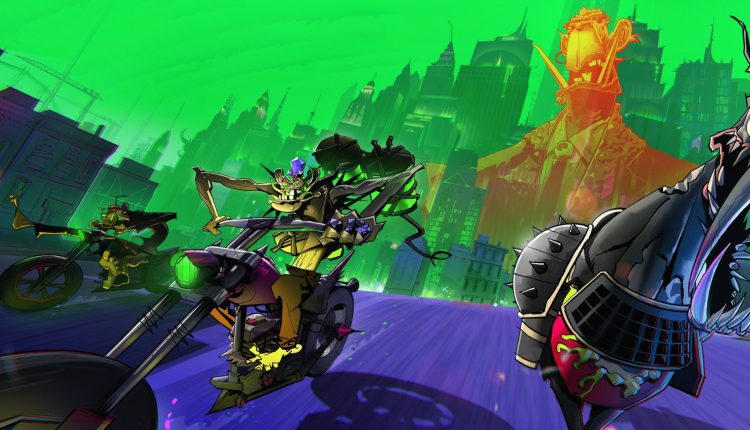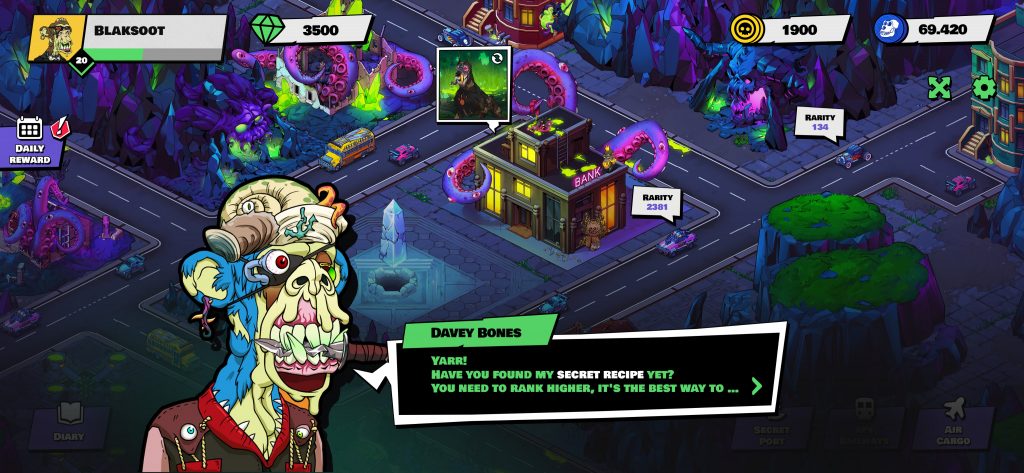Faraway and Mutant Cartel are breaking new ground with Serum City

While a growing number of developers downplay the blockchain aspect of their web3 projects, the founders of Serum City take the opposite route.
A secondary collection build around Yuga Labs’ Mutant Apes NFT collection combined with the experience from building FPS Mini Royale: Nations, Novel Labs and Faraway Games are as blockchain as it gets. And they’re happy to talk about it.
We wanted to dig deeper into the thinking behind forthcoming city builder Serum City, so we sat down with Alex Paley from Faraway and Lior from Novel Labs; the latter being the team behind Mutant Cartel and Mutant Hounds.
Lior explained his way into web3, which started seven years ago when he began investing in crypto. “Then I got into NFTs and web3 gaming. I have a deep passion for both and with this new community [Mutant Cartel] that we started about 18 months ago, an emphasis was to create opportunities and experiences that touch on the most fundamental aspects of web3. It was definitely a part of the vision from day one.”
Paley comes from a more traditional gaming background. With experience of working at Glu Mobile, he started Faraway with co-founder Dennis Dannel. Their first game Mini Royale: Nations, is an FPS that launched on Solana.
“Our big focus at Faraway has been around interoperability. With the Ready Player Me avatar integration, all of our season four Mini Royale avatars are interoperable, both inside Mini Royale, as well as in the 6,000 other Ready Player Me experiences,” he says.
“I think interoperability will define what web3 gaming is and what web3 game design can be, so we’re leaning heavily into that, which brings us to Serum City. Items produced in Serum City will be usable in other games, and other games’ products can be used in Serum City.”
Teaming up
Faraway is currently also working on another city builder, Faraway Land, and Mutant Cartel is busy building its own projects. Some might say it’s an unexpected collaboration, so how did it come about?
“The interoperability element is how we came to partner. It started at a strategic level, which you don’t see a lot in web2, whereas in web3 the value creation is so clear that it was easy for us to team up.
“In the long term, there’s one really cool property about web3 games that web2 games don’t have. That inherent composability, interoperability, as well as their permissionless nature. Once Serum City is out there, anyone can benefit from the same interoperability. We’re here to push that to the extreme, both in how we got together to work on this, but also in the properties that we want to accentuate in Serum City,” Lior says.
Paley adds, “It’s like Mutant Cartel was a branch, a layer two of the broader Yugaverse. That would never happen in the web2 world”.
Permissionless creativity
The Mutant Cartel arose from the Mutant Apes project. Following this the Cartel also created its own Mutant Hounds.
“Based on this seed of permissionless innovation that was given to us by Yuga Labs, that’s what gave life to the stories around the Mutant Cartel and this entire movement. We understood that it would be cool if you could add high-fidelity content, original IPs, to this existing universe. If Yuga Labs and the Bored Ape Yacht Club is Ethereum, then we’re an application on top of it”, Lior says.

Part of the Yugaverse, city builder Serum City was announced in early April. So far we’ve only seen a couple of screenshots of this dystopian mutant art theme, sprung out of the Bored Ape and Mutant Ape collections.
Of course, Mutant Apes were created when Bored Apes were combined with the airdropped serum NFT. But in the world of Serum City, the narrative is that Bored Apes look down on the Mutant Apes as their inferiors.
“Narrative is powerful, and the speculation on where that narrative could eventually lead is extremely powerful”, says Paley.
Lior agrees, “I think what people are missing is depth, in web3 gaming especially. We’ve set out in our microcosm, in our universe, to be the best storytellers in the space. And we lashed on to the Yugaverse because they are the most important assets in the metaverse right now.”
“Yuga is the biggest brand in the space, specifically because they gave people like us that power to tell stories, to be creative.“
As for the game itself, it revolves around the rise of Cartel’s mutants BlakSoot and Darkfang and how players rise up the ranks; something that the city-building genre makes obvious in terms of the quality and quantity of the buildings you construct and the increasingly sophisticated outputs they create.
More cartels
As for the broader outcomes of games such as Serum City, Lior hopes it will encourage more projects to start up using the NFTs provided by Yuga Labs and also Mutant Cartel.
“Ideally we’ll see 100 more Mutant Cartels in the next 10 years. Some of them will be great. Some of them will be different. But the entire idea is that we’re breaking new ground. Every web3 product revolves around a community. I hope that this is exactly what they wanted to see,” he says.
Set to launch in Q3 2023, Serum City Season One will be accessible for holders of Bored Apes, Mutant Apes, Mutant Hounds and Mutant Cartel’s Genesis Oaths NFTs.
“We’re not looking to necessarily reach a million people from day one. That’s probably the most sustainable way of building something of size and importance in web3″, Lior finishes.
Keep up-to-date with the action via the Mutant Cartel website.
